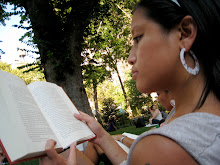About Me

- rowena
- New York, New York, United States
- "Life isn't divided into genres. It's a horrifying, romantic, tragic, comical, science-fiction cowboy detective novel."
Thursday, November 19, 2009
Thursday, November 12, 2009
Monday, November 9, 2009
Friday, October 16, 2009
East to West to East

As an editor and an avid reader, the English language is my first love. I revel in words -- in the complexity of grammar, in the punctiliousness of punctuation. That is why I find my roommate’s telephone conversations with her mother endlessly fascinating. They joke, bicker, parry and banter with a fluidity that is enviable. My own conversations with my mother are stilted, awkward, tedious. The language barrier between a foreign parent and a first-generation child is one that is rarely overcome, and I really only discovered this after moving from the West Coast to the East Coast.
As a child, my grasp of the Mandarin language was much stronger than it is now, especially since it was my first language. Conversations, arguments, jokes with my mother in our native tongue were easy. Furthermore, the majority of my childhood friends were also Chinese, or Korean, Vietnamese or Japanese. I saw through their family interactions that speaking English was naturally secondary. A language barrier existed between all my friends and their parents, so I came to view that as quite normal.
As time passed and I became increasingly enamored with the English language, my Mandarin skills languished. Contrarily, I believe that was when my mother’s English-speaking skills were at their best. She vigilantly attended PTA meetings, discussed grades with my teachers, and communicated with my ballet instructors. Sure, our interactions were still a bit awkward (consisting of a healthy mix of Chinese and English, “Chinglish,” if you will), but English soon became the dominant language in our household.
Looking back now, I wonder if that caused my parents a certain measure of regret. Of course they migrated to the U.S. to provide better opportunities for their children, but I wonder if one day, my mother sat down with a heavy heart, not sure of when the exact moment her family became “Americanized,” but knowing with a weighty certainty that it had.
In high school, I was dead set on moving to the East Coast for college. My parents were wonderful -- especially my mother -- and they encouraged me to research as many opportunities as possible. In the end, I decided on Boston University. To say the move was unsettling is quite the understatement. I mean, think about it. I left the bubble-like enclave of Asian-dominated Irvine, California, to go to a vast and confusing melting pot. The very first person I met at BU happens to now be my roommate. And I can safely say that she was and is my first non-Asian best friend.
It was through her that I first witnessed what it’s like to be on the same language-level as one’s parents. Seeing her interact with her mother -- being able to use words seemingly simple, but impossibly strange to my own parents -- was startling. I admit that I came to resent my parents for a while. Why did they have to move to the U.S. and impose this frustrating impediment on my childhood, on my relationship with them?
Nevertheless, I did my best to keep up my Mandarin-speaking conversations with my parents. I took a Mandarin course at college for a year or two, and I know my mother was absolutely thrilled, diligently helping me with my homework almost every night.
Several years have passed and I am now living in New York City, working as an editor. I think it’s safe to say that I’ve never been more removed from my heritage. I deal all day, every day with the English language, with its myriad and infinite intricacies. Mandarin now sits on a dusty corner shelf of my brain. Out of my closest friends, one is Chinese and the rest are mostly Caucasian. Not to say that that’s in any way negative. I mean it’s certainly one of the reasons why I wanted to leave the West Coast in the first place, to branch out and explore what a vastly different world had to offer me. However, lately I have begun to yearn for a return to my roots, to my culture.
Yes, I envy my roommate’s easy conversations with her mother, but I am also proud of the ones I have with my own. I am proud because we always try our best to communicate, even if it means transcending the barrier of language. Of course we often lose our patience with each other, but when an understanding is reached, and we are as one, that moment can be exquisitely beautiful. I love my heritage, and I’ve even come to love how difficult it can make things. But that is, in essence, the beauty of my East-to-West-to-East life.
Monday, October 5, 2009
Wednesday, September 30, 2009
Tuesday, September 15, 2009
The Nile

Close your eyes. Breathe deep. What do you smell? The foamy tang of the river water, a faint tinge of spices, the earthy sand after a day spent baking in the sun. The Sahara is to your left, a village darkened by night, to your right.
You are on a felucca, a water vessel of the ancients, slicing through the Nile. You think back, to the day you just spent at the Nubian village -- playing soccer with the laughing children, exploring their bright, clay domiciles, eating roast lamb with your fingers, the grease dripping down your wrists as you took in your new surroundings with commingled joy and awe.
Now on your journey back, you lean back against the hard seat of the felucca, raise your face to the stars. They are heartbreaking in their clarity. The only sound is the rushing water as the boat cleaves the river. The desert is a stark and desolate presence, overwhelming -- yet you do not feel alone. The night is cool, the breeze is alluring, calling your name. Your limbs are slack. You lean back and sigh, trail your fingers through the warm waters.
Never have you felt more alive.

Monday, August 31, 2009
Monday, August 24, 2009
A Fraction of the Whole
 A Fraction of the Whole is, in essence, the quirky saga of Martin Dean and his son Jasper. Martin is a professed misanthrope, railing against anything and everything, but especially against the institution that is society. He has serious hang-ups about his brother Terry, who was revered by the general public as first a sports star and then an infamous murderer. Martin's gripes with life are passed down to his son Jasper who grows up struggling to be his own person, but finding it basically impossible with his father's constant diatribes poisoning his independent thought.
A Fraction of the Whole is, in essence, the quirky saga of Martin Dean and his son Jasper. Martin is a professed misanthrope, railing against anything and everything, but especially against the institution that is society. He has serious hang-ups about his brother Terry, who was revered by the general public as first a sports star and then an infamous murderer. Martin's gripes with life are passed down to his son Jasper who grows up struggling to be his own person, but finding it basically impossible with his father's constant diatribes poisoning his independent thought.Martin's unusual life takes him from the Australian bush, to languid Paris, to a labyrinth of his own making and to sweltering Thailand. Peppered in the midst of these journeys are both Martin's and Jasper's acute and often side-splittingly hilarious view on life.
A few of my favorites:
"I have nothing against children, I just wouldn't trust one not to giggle if I accidentally stepped on a land mine"
"Her mask was a weave of tattered shreds torn from all the beautiful parts of herself."
"loneliness..how it's like the slow squeeze of testicles by a hand that's just been in a refrigerator."
"Play the game of life without trying to work out the rules...and above all, bless every single minute of this silly season in hell"
I thought this book was absolutely brilliant. Delightfully strange and so damned funny. The characters leap out of the pages with their varied idiosyncracies. (My only quibble is that it's tough to differentiate between Martin's voice and Jasper's. Although I suppose that's Toltz's point.)
And while I'm not a misanthrope (at least not all the time), I felt an unholy glee reading through the many anti-everything tirades scattered throughout the novel. What a refreshing read!
Monday, August 17, 2009
Wednesday, August 12, 2009
The Stand

In 1990, nearly 99% of the world's population is wiped out by the accidental release of a U.S. govt-created plague. Called Captain Trips by many, and Superflu by others, millions of people die horribly, in a state of delirium and fear, choking on their own mucus. However, about 1% of the population is not affected. These people are left to rebuild the shattered remains of their world. Half are compelled to follow their very vivid dreams to Boulder, and the other half...their nightmares to the dark man in Vegas.
The Stand rates as one of my top 5 favorite books of all time. To me, this novel is Stephen King's most courageous dive into the study of sociology and parapyschology. I am most fascinated by how vividly he outlined the post-apocalyptic world. I mean, think about it, money no longer matters...education, status, fashion. All of what we hold so dear to us now, is basically moot. Everyone gets the opportunity to start fresh. Of course, humans being humans...many will make the same mistakes, even after being forced to learn such a catastrophic lesson.
What also intrigued me was how quickly the Dark Man's society was set up again. They had water, electricity running, even the beginnings of a school system. As Glen Bateman so adequately put it, many techies would be drawn to the dark man's side...they crave order and structure, perhaps even at the cost of their freedom and peace of mind.
However, on Mother Abagail's side, while people felt (relatively) safe, organizationally, there was almost total chaos. Even with the institution of the governing board (or perhaps because of?) it took much longer for this group to get rolling. As Bateman said again, Mother Abagail's side consisted mostly of professors, writers, free-thinkers. In truth, these kinds of people are most useless in the direct aftermath of an apocalypse.
These are just a few of the points I found most fascinating with this novel. The parapyschology aspect I enjoyed, but it's the sociological implications that I found to be much more unsettling. And to me, a great novel is one that is completely disarming.
Tuesday, July 21, 2009
Monday, July 13, 2009
Thursday, July 9, 2009
A perfect Saturday

written for Pops Yow for Father's Day 6/21/09
It was a warm, drowsy day. She sat idly on the couch, book laid forgotten by her side. Her eyes were bright with daydreams prompted by the gentle winds drifting in from the screen door. A perfect Saturday.
Her reveries were suddenly disturbed by the appearance of her father, hands laden with wooden boards. He marched around the backyard, laying down the boards, picking up a red box of tools and bringing them out one by one.
The girl frowned, the hazy cobwebs of imagination dispersed by the all too real apparition. She peeled herself off the couch and made to move. Her father spied her from the backyard and called her over. She stopped, pondered feigning deafness, thought better of it and went out to her father.
He asked if she would like to help him build something. The girl stood in the noon sunshine listlessly. She asked what. He responded that it would be a surprise. Intrigued against her will, the girl agreed to help. The father nodded and smiled. He handed her a hammer and pointed to the stack of wooden boards, instructing her to remove the old nails from the boards. Instantly, the girl regretted volunteering her services, but settled down to her task with a martyred air. The father picked up a tape measure and whistling, proceeded to measure another stack of boards, making little marks on the boards with a blunt pencil. 
A cool breeze swayed the leaves on the orange trees, setting the wind chime alight with fractured sound. The father’s whistling floated away on the tails of the wind.
The afternoon idled by and the girl found herself enjoying the work. She held on to one end of a board while her father sawed -- the measured silence between them pleasant.
Lunchtime brought the mother out with glasses of cranberry juice and chilled noodles with tangy dipping sauce. Father and daughter sat on the porch, sweaty, dusty, slurping up the cold noodles.
After lunch, the father abruptly disappeared into the house. A few moments later, he returned with a small portable TV. He propped the tv up, plugged it in and switched it on. The screen was small, the sound scratchy and the image fuzzy. It was the World Cup. They went back to work, the girl now sanding down cut boards while the father continued to saw.
An explosion of cheers from the TV made the girl look up. She began to ask the father questions about the game. Amiably, he turned the sound down and explained. The girl was intrigued and soon both she and the father were cheering the game on. A goal made caused both girl and father to whoop and holler in glee. The mother, hearing the din from in the house smiled.
The afternoon’s heat lifted as the sky turned to dusk. The white roses on the bushes beyond the porch shone like creamy moons in the fading light. Girl and father hammered away, now chattering together like a pair of magpies.
As full dark descended, the back porch light flicked on and the girl and the father surveyed their finished work with satisfaction. A bookshelf for her room.
Girl and Father stood side-by-side and smiled in unison.
A perfect Saturday.
Wednesday, June 17, 2009
Wednesday, June 10, 2009
Department of Eagles - No One Does it Like You
new song obsession. creepy video. I want to choreograph a dance to this song.
Wednesday, June 3, 2009
Different Seasons

Different Seasons is a compilation of four of Stephen King's most praiseworthy (in my opinion) novellas: Shawshank Redemption, The Body, Apt Pupil and The Breathing Method. The stories take place in different time periods and locations, exploring the deep-seated emotions in us that are brought to the forefront through extraordinary situations.
Shawshank as most people know, is a fantastic movie. But a lot of people don't realize it began as a King novella...and what a tale. A mere 100 pages long, the story sears with Red's descriptions of Andy's desperate resilience through one of the hardest privations known to man.
Of the four stories, Apt Pupil was the one that bothered me the most. Probably didn't help that I read this for the first time when I was about 13. Not really healthy pre-teen reading..I couldn't shake the unease I felt reading about the bitter fall of a young American boy who had such a bright future before him. The idea behind this gruesome story unsettled me for weeks..
The Body is one of SK's best works in my opinion. The story of four young boys journeying through the hot summer days is one of self-exploration and of the ties that bind us in the midst of hope and fear. It is truly a simple yet exquisite tale.
The Breathing Method is the shortest of the four and the most unusual. At times it's gory and disturbing, but the underlying idea behind it will certainly make you set the book down and ponder the impregnability of sheer human will.

















































